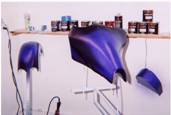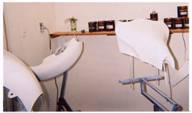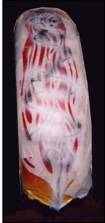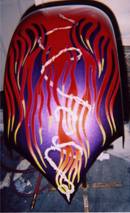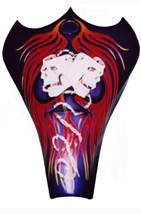Custom Paint Your Chopper!
No matter what drive train you select for your chopper, without a custom paint job the sled just won’t have what it takes to stand out in a crowd. With bolt on chopper kits, anyone can have a chop, and for a true show bike, you need the added pizzazz of one-of-a-kind artwork for the frame, fenders and tank.
Our friends, Tom and Sue Utley at in Cocoa, Florida were kind enough to share the paint sequence of a gorgeous custom bike build recently for a client.
Tom’s Painting Background:
Custom paint is a true art form. Custom paint has little in common with the standard solid color paint job seen on cars and many motorcycles. So how did Tom become a custom motorcycle artist?
First he became renowned in Los Angeles for his artistic skills with custom art and graphics for movies, television and the recording world. Having worked as Production Designer and Art Director on such well-known productions as Renegade and Silk Stalkings for USA Network, he became the Lead Scenic person for the epic movie Titanic.
Leaving the hustle and bustle of LA, he and Sue decided it was time to move to the slower life of Central Florida’s sunshine and turn his hobby of custom motorcycle painting from a passion into a career. You’ll see from the photos of his work why he is so successful!
Selecting an Artist for Your Custom Paint:
While
we are on the topic of artists’ backgrounds, we should learn how to
select an artist for your own custom chopper paint. Not every great
motorcycle artist has to have arrived by way of Hollywood. Tom just
happened to have done so. What you do need is an artist, not a friend
who wants to help you play with some expensive paint and possibly end up
having to strip and start again. Paint is always much easier to apply
than it is to remove!
One way to find a good custom paint artist
is to simply ask around. If you have some friends who ride sleds with
custom paint that you think is the quality of work you desire, ask for a
referral to their artist. Most people are more than happy to lead the
way to their source of great work.
A trip to a bike show, like Daytona Bike Week, will allow you to see a multitude of custom paint jobs.
You’ll run into people with some really unique scoots that will gladly
tell you where they had their paint artwork done. There will also be
trade show booths and probably quite a few custom artists there to
discuss the topic of custom jobs.
A trust custom paint job is
normally a one-of-a-kind piece of art. The design is created for you and
the masks are created for your paint job. Afterward the art is
normally photographed for the artist’s records and all masks, if any are
remaining, are destroyed. This is true one-of-a-kind design work. You
may see another chop out there with something similar in theme, but
artists do not duplicate work from bike to bike. The custom paint world
is nothing like the world of production paint where motorcycle parts
are run through paint booths one after another.
What Will It Cost?
The
cost will vary based on detail and how complex you want your custom
paint. From solid paint with custom touches to the extreme motorcycles
that are rolling artwork, you can spend from a few hundred dollars to
thousands. The cost is largely up to you.
Look for a
professional that has a good standing in the community and has plenty of
samples of work to show you. He probably rides his own rolling art as
well, but not always. These custom artists are not going to be the
people you find at flea markets air brushing car tags that say “Hot
Mama”! Their art work will be of the finest detail.
If you want
a simple design along with some pin striping, the cost will not be that
great. If you want a full-blown, eye-popping, frame-up paint job to
include every tiny detail you will pay for the quality of a
professional.
Can you bring your own drawing and have it
painted? Possibly. That is between you and the graphic artist
involved. Some paint shops will be happy to take your work and
re-create it on your scoot for you. Other shops only do original
designs of their own.
Creating the masks takes a lot of work and
besides purchasing the intellectual idea that only an artist’s
imagination can come up with, the work involved to create functional
masks is not small. This is a large part of the cost. The mask is used
to prevent paint from going where it is not wanted and allow it to go
where it is desired. Many custom paint jobs require layers and layers
of masks to obtain the finished product. The more detail and colors,
the more masks required. The finer the detail, the more time required to
create an effective mask.
One Custom Paint Job...
We’ll
share with you the process for one of Tom’s beautiful custom paint jobs
created on a motorcycle he built. This chop is a fantastic example of
rolling artwork!
The Beginning:
There’s always a beginning, even with a motorcycle paint job. First, the client determined exactly what the motorcycle build would be – engine, options, and the all important paint. He and Tom determined a design that met the client’s desires in every way.
Below, you will see the two fenders and the custom-shaped gas tank to which artwork will be applied. The parts are simply plain white and ready to begin the task of creating the custom paint.
The Next Steps!
Fender Highlight:
The fender on this chop will contain a black highlight under the paint. The bracket-shaped end of the fender will add to the lines of the gas tank which is a radically modified coffin shape. You might think that all highlights would be applied last, but this under-paint highlight is applied in the very first step because it will show beneath and slightly through the end of the fender’s paint. The same highlighting is applied to the gas tank front and side and will be visible in the next picture.
Background Colors:
The next step is to apply the background colors. Maintaining the highlight areas, the gas tank and fenders are sprayed with the solid blue which will form the canvas on which Tom will work. You will be surprised when you find that the end product actually has little blue showing.
But the trick that paint artists know is that one layer at a time is applied. Just as oil painters prepare their canvases with background color applications, so too, the motorcycle custom paint artist must prepare the canvas with a background color!
Masking:
From this point onward, color areas which should not have another color applied will need to be preserved using masks. These masks are made of a lightly sticky adhesive paper or vinyl that, when applied to the motorcycle part, will not slip or move.
The mask has to be cut very carefully by hand to remove those areas where the next color should appear. This is where the details get very, very tricky. The fine details require very fine cuts into the mask. A sloppy cut will provide a less than sharp finished art design.
Artists can spend hours and hours cutting a single mask for a custom paint job. Many custom paint jobs such as the one Tom is doing for this chopper require many masks to create. You will easily see from the mask detail at left that it isn’t about the paint spray time; it’s all about the mask cut time!
Each of the vacant spaces in the mask applied to the fender at left will accept paint during the next color spray.
Once the paint dries, the mask will be removed, revealing where the previous color has been protected from color change during the addition of the new color and design.
After several masks have been applied and the red flames plus white highlight have been added, the fender looks nothing like the white curve that Tom started with. Note at the end of the fender where the curved edge is, and along the sides, the black highlights have been preserved for effect.
In the rear fender photograph below you can see even more of the detail Tom put into this artwork. The yellow flame tips are clear. These touches are added before the mask is removed after the reds are sprayed onto the tank. Airbrush techniques allow for fine details of this type.
It’s starting to look like fine artwork at this point! Of course, at the same time, Tom has been working on painting the other chopper parts. After all, he doesn’t just get to take a break while the paint dries!
What a complex and detailed fender this chopper will have when assembled. This one is clearly going to be a traffic-stopper!
The End Result:
The gas tank is the best depiction of the end result. Detailed with each color and using the same theme of flames overlaid with mirrored skulls and white highlights, the gas tank pulls the entire design together.
In the case of the chopper paint job shown here, Tom will bolt everything onto a radically chopped frame, add a top of the line leather saddle, accessories such as the skeleton hand mirror and his customer is ready to roll out onto the road on a brand new chopper unlike any other.
With a custom paint job of this detail and quality, any biker would be proud to show their new chopper off to everyone. Adding details of chrome and accessories while maintaining the clean lines and avoiding detracting from the striking paint work, this bike is likely to win awards in any motorcycle show anywhere!
